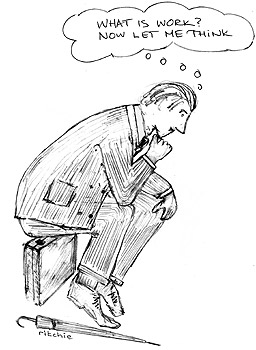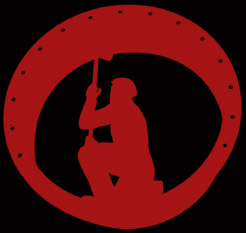
| HOME |
| NERVE |
| REVIEWS |
| ARCHIVE |
| EVENTS |
| LINKS |
| ABOUT US |
| CONTRIBUTORS |
| BACK ISSUES |
| CONTACT US |
Back to index of Nerve 13 - Winter 2008
 Work
is a four letter word
Work
is a four letter word
By Brian Ashton
"Personally, I have nothing against
work, particularly when performed, quietly and unobtrusively, by someone
else. I just don't happen to think it's an appropriate subject for an
ethic."
Barbara Ehrenreich
We work to live; we don't live to work, so goes the old trade union saying. When you are coming off a hard day's labour you might think that the last part of that saying is the reality, that you are just like the worker bee or the soldier ant - born to graft. Some people see work as a blessing, others see it as a curse, and there are others who seek to define what work is and what it isn't.
Back in the late seventies the media was full of tales of what was to come as the microprocessor revolution unfolded. We were going to see the end of work as we knew it, no more drudgery; life was to be one long educational process. We were to be free of the grind of physical labour, instead we would learn new skills, and as technology freed us from the arms of toil we would be able to work more effectively and spend less time doing it. And at Christmas, Santa would fill our stockings with goodies, and pork chops would fly.
A cynical viewpoint, you might think, but what is the reality of work today? Have we been freed from boring monotonous labour? Have we developed new skills, or have the computers sucked our brains dry and commodified our knowledge? The workers at the Halewood car plant rebelled against the tyranny of the production line in the 1970s, as they sought to express their humanity. They took the materials that were available to hand and produced artefacts that required their creative talents as well as their physical abilities. They did so because it is unnatural to spend life carrying out work that has been planned by others. The urge to be creative constantly comes up against the imposition of work discipline. Back then companies used hierarchical management structures to impose discipline on workers, with high levels of shop floor supervision used to firefight when trouble broke out. The system of work employed in those days was known as Taylorism, named after an American engineer, Frederick Winslow Taylor. He saw workers as no more than tools; engineers would decide how those tools were to be used, all that was required of the workers was their muscle power. Some have described this form of work as alienated labour.
 Today
it's much different, isn't it? Well, the language of management is different;
now we have line managers and team workers, partners and WalMart family
members. Them and us, bosses and workers, are phrases that have been consigned
to the shredder of history. They try to make out that class conflict is
a thing of the past. What do you think? Do you look forward to going into
work; can you not wait for the weekend to finish so you can get stuck
into the Monday morning team meeting with your non hierarchical team leader
and line manager? Or does the term 'weekend' have no relevance to you
because you're on permanent standby and when they whistle you have to
come a-running?
Today
it's much different, isn't it? Well, the language of management is different;
now we have line managers and team workers, partners and WalMart family
members. Them and us, bosses and workers, are phrases that have been consigned
to the shredder of history. They try to make out that class conflict is
a thing of the past. What do you think? Do you look forward to going into
work; can you not wait for the weekend to finish so you can get stuck
into the Monday morning team meeting with your non hierarchical team leader
and line manager? Or does the term 'weekend' have no relevance to you
because you're on permanent standby and when they whistle you have to
come a-running?
Is work a necessary evil, or is it something that can be spiritually uplifting? The writer, artist and socialist William Morris had 'Labour and Pleasure versus Labour and Sorrow' as a working title for one of his essays; he was posing the difference between labour as the protestant work ethic - that is virtue through suffering - and work that was the product of human thought, imagination and skill, and consequently contained "some human happiness". When the teacher bemoans the form filling and box ticking and the factory worker does the same task thirty or forty times per hour and the call centre operator says "Good morning, how may I help you?" for the umpteenth time, happiness seems like a foreign word. Morris was trying to do two things at once when he eulogised work; he was looking back to the craft workers of medieval times and the beauty they created, and looking forward to his vision of a socialist society in which work would be a varied and enjoyable source of education.
If skill levels have increased across the workforce then surely work is an enjoyable experience, and William Morris would be happy to be employed in a 21st century workplace. Higher levels of skill mean that workers have more say and more control over what they do and how they do it, doesn't it? Or is it a fact that developments in technology don't increase workers' skill levels; instead they result in the degradation of work and the worker, making the worker more easily replaceable. It has been said that technology is not neutral, but that it is a system of control and discipline designed to keep her or him productive and in line. Or to put it another way, technology has Taylorism built into it.
When asked what are the things a normal balanced person should be able to do well, Sigmund Freud replied: "Love and work!" In doing so he was attaching to work a value that raised it above mere economic necessity, making it a potential means of self-realization, thereby helping the individual to integrate into reality, and in particular that part of reality which is the human community. Further to that, the French sociologist Georges Friedmann remarked on the deep and urgent need of internees in the Second World War to work with their hands, including those who had not been manual workers before the war. What do you think? Do you see work as an uplifting experience, something more than economic necessity, or do you see it as something to do until the pubs open?
Sorry Comments Closed
Comment left by Colin R on 4th December, 2008 at 19:46
No work, no money. And no money under capitalism means no life. Ironic that, for the majority of the time, we spend our leisure time spending!